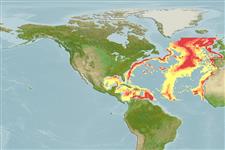Common names from other countries
Elasmobranchii (haaien en roggen) (sharks and rays) >
Rajiformes (Skates and rays) >
Rajidae (Skates)
Etymology: Rajella: Latin, raja, -ae = a sting ray (Raja sp.) (Ref. 45335).
Environment: milieu / climate zone / depth range / distribution range
Ecologie
marien bathydemersaal; diepte 650 - 4156 m (Ref. 4426), usually 1500 - ? m (Ref. 3167). Deep-water; 60°N - 10°N
Eastern Atlantic: Rockall Trough along Ireland, northern Bay of Biscay, northern Morocco and Azores, off Rio de Oro (Western Sahara) and Conakry (Guinea). Western Atlantic: Grand Banks off Newfoundland, Canada southward to northeastern Gulf of Mexico. Distribution probably much wider in deep water.
Grootte / Gewicht / Leeftijd
Maturity: Lm ? range ? - ? cm
Max length : 55.0 cm TL mannelijk / geslacht onbekend; (Ref. 4426)
Found on continental slopes and deepwater rises (Ref. 3167). Oviparous. Distinct pairing with embrace. Young may tend to follow large objects, such as their mother (Ref. 205). Eggs are oblong capsules with stiff pointed horns at the corners deposited in sandy or muddy flats (Ref. 205). Egg capsules are 5.3 cm long and 3.0 cm wide (Ref. 41249).
Levenscyclus en paargedrag
Maturities | Voortplanting | Spawnings | Egg(s) | Fecundities | Larven
Oviparous (Ref. 3167). Paired eggs are laid. Embryos feed solely on yolk (Ref. 50449). Distinct pairing with embrace. Young may tend to follow large objects, such as their mother (Ref. 205).
McEachran, J.D. and K.A. Dunn, 1998. Phylogenetic analysis of skates, a morphologically conservative clade of elasmobranchs (Chondrichthyes: Rajidae). Copeia 1998(2):271-290. (Ref. 27314)
Status op de Rode Lijst van het IUCN (Ref. 130435)
CITES (Ref. 128078)
Not Evaluated
Gevaar voor de mens
Harmless
Gebruik door de mens
Visserij:
Tools
Speciale rapporten
Download XML
Internetbronnen
Estimates based on models
Preferred temperature (Ref.
115969): 3.3 - 5.2, mean 3.9 (based on 389 cells).
Fylogenetische diversiteitsindex (Ref.
82804): PD
50 = 0.5000 [Uniqueness, from 0.5 = low to 2.0 = high].
Bayesian length-weight: a=0.00302 (0.00141 - 0.00645), b=3.24 (3.07 - 3.41), in cm Total Length, based on LWR estimates for this (Sub)family-body shape (Ref.
93245).
Trofisch niveau (Ref.
69278): 3.6 ±0.5 se; based on size and trophs of closest relatives
Weerstandsvermogen (Ref.
120179): laag, minimale populatieverdubbelingstijd 4,5-14 jaar (Fec assumed to be <100).
Fishing Vulnerability (Ref.
59153): Moderate vulnerability (42 of 100).
